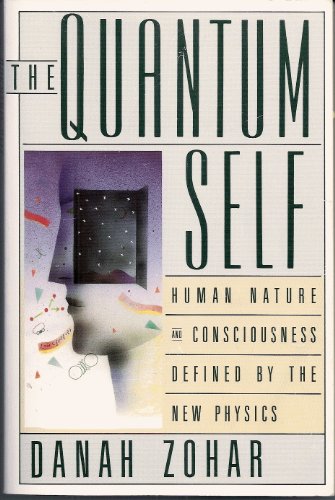zohar danah collaboration i n marshall (1 resultados)
Tipo de artículo
- Todo tipo de artículos
- Libros (1)
- Revistas y publicaciones
- Cómics
- Partituras
- Arte, grabados y pósters
- Fotografías
- Mapas
-
Manuscritos y
coleccionismo de papel
Condición
- Todo
- Nuevos
- Antiguos o usados
Encuadernación
- Todo
- Tapa dura
- Tapa blanda
Más atributos
- Primera edición
- Firmado
- Sobrecubierta
- Con imágenes del vendedor
- Sin impresión bajo demanda
Ubicación del vendedor
Valoración de los vendedores
-
THE QUANTUM SELF: Human Nature And Consciousness Defined By The New Physics
Publicado por NY. 1990. Wm. Morrow, 1990
ISBN 10: 0688087809ISBN 13: 9780688087807
Librería: Chris Fessler, Bookseller, Howell, MI, Estados Unidos de America
Libro Original o primera edición
tan & white 1/2 cloth hardbound 8vo. 8º (octavo). dustwrapper in protective plastic book jacket cover. very good cond. binding square & tight. few brown spots on the cover cloth. tiny ding in top edge of front cover. corners bumped. top edge a little soiled. contents free of markings. dustwrapper in fine cond. minor rubbing, bit of wrinkling, not torn or price clipped. nice clean copy. no library markings or store stamps, no stickers or bookplates, no names, no inking , no underlining, no remainder markings etc ~. first edition so stated. first printing ( # 1 in # line). 268p+ author bio note. b&w diagrams. notes. bibliography. index. physics. philosophy. psychology. ~In The Quantum Self, Danah Zohar argues that the insights of modern physics can illuminate our understanding of everyday life~our relationships to ourselves ,to others, and to the world at large. The upshot is a whole new quantum psychology. Drawing on the strange and fascinating workings of the subatomic realm to give us a new model of human consciousness, the author addresses enduring philosophical questions. Does the new physics provide a basis by which our consciousness might continue beyond death? How does the material world (for instance, very ugly inner cities) impinge upon our sense of self? Is there a subatomic wellspring from which our creativity, our empathy with others, and our feelings of unity with the inanimate world originate? Danah Zohar shows how the vitality of the new physics combats the alienation and fragmentation of twentieth~century life, and replaces it with a model of reality in which the universe itself may possess a type of consciousness, of which human consciousness is one expression. In exploring the many ramifications of Quantum consciousness, The Quantum Self touches on the major concerns of human life: Quantnm psychology offers a compelling critique of Freudian psychoanalysis and existential despair. It takes us beyond Freud's isolated, self~centered ego and beyond the empty, alienated self of existentialism. Quantum responsibility shows that we are free and responsible for the world. According to the author, "Each of us, because of our integral relationships with others, with Nature, and with the world of values, has the capacity to beautify or taint the waters of eternity." Quantum morality introduces "the constraint of the natural" and shows that behavior is good or bad depending upon whether it accords with the natural laws of consciousness and relationship. "We have a moral imperative to use our freedom, to live at the fearsome edge of our consciousness when called upon to do so, because it is our very nature as quantum persons to be free, and, in quantum terms, the natural and the moral go hand in hand." Quantum aestltetics shows why a balanced and beautiful environment is both natural and necessary to the unfolding of our humanity. Quantum immortality shows that through committing ourselves fully to the larger processes of life and relationship, we can survive as persons beyond the body's death. The quantum world view stresses dynamic relationship as the basis of all that is, and tells us that our world comes about through a mutually creative dialogue between mind and body, between the individual and his personal and material context, and between human culture and the natural world. Quantum theology makes it clear that the physics of human consciousness is also the physics of the quantum vacuum itself, the ground state of all that is. In this light, "we might come to see ourselves as thoughts in the mind of God.".


